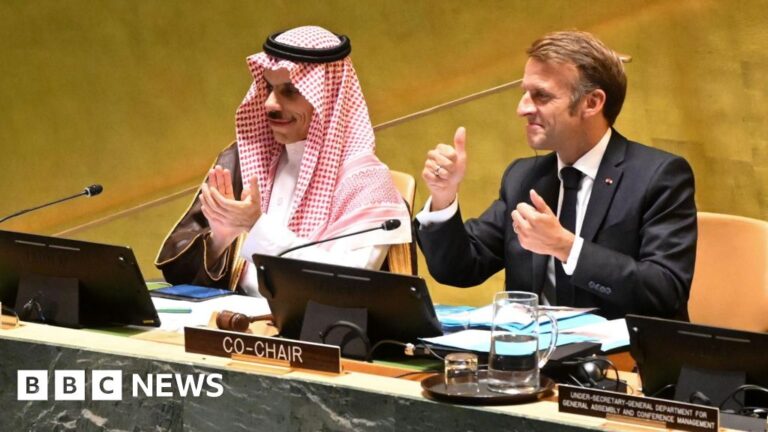Historic Recognition of Palestine: A Diplomatic Gamble
In a significant move, Britain and France have formally recognized a state of Palestine at the United Nations, marking a pivotal moment in the long-standing Israeli-Palestinian conflict. This unprecedented decision comes amidst escalating violence and humanitarian crises in Gaza, illustrating a growing belief among major European powers that bold action is necessary in the face of a deteriorating situation.
The Diplomatic Context
French President Emmanuel Macron emphasized that “right must prevail over might,” as he condemned both Israel and Hamas for their roles in the current turmoil. His coordinated actions with the UK, under the auspices of Saudi Arabia, are aimed at revitalizing the long-sought two-state solution, which both countries now view as essential for a just future for Israelis and Palestinians alike.
Risks and Reactions
Israel swiftly voiced its anger, perceiving the UN conference and the European nations’ stance as a reward to Hamas following its aggressive actions, including a deadly attack on Israel on October 7, 2023. Some Israeli officials proposed aggressive responses, such as the annexation of parts of the West Bank, effectively barring the possibility of a viable Palestinian state.
US-Europe Divisions
The growing divide between the Trump administration and European allies adds another layer of complexity to the situation. The U.S. continues to affirm its support for Israel, even going so far as to bar Palestinian Authority President Mahmoud Abbas from attending the UN conference. Abbas instead communicated via video link, reflecting a troubling schism between Washington and its European partners regarding Middle Eastern diplomacy.
The Humanitarian Crisis
On the ground, humanitarian conditions in Gaza deteriorate daily, with reports of significant civilian casualties and ongoing conflicts. Meanwhile, tensions rise in the West Bank as Israeli settlements expand and violence escalates. The frustrations are compounded by the lack of tangible progress toward peace, suggesting that military pressure is unlikely to achieve Israel’s goal of neutralizing Hamas.
Seeking a Viable Solution
Macron’s diplomatic strategy aims not only to address the immediate crisis in Gaza but also to pave the way for a sustainable resolution in the form of two independent states. This initiative underscores the belief that Israel’s current strategies have failed, instead exacerbating civilian suffering and threatening remaining hostages, while inviting questions about the effectiveness of military approaches.
Collaboration with Saudi Arabia
Notably, the Saudi Arabian government co-chaired the UN conference, signaling an evolving regional dynamic. France asserts that this collaboration offers crucial leverage over Hamas, as key Arab nations call for disarmament and a clear leadership role for the Palestinian Authority. This dynamic could create incentives for Israel while promoting a normalization of relations with Arab states, a goal that has long been pursued by both Israeli and American leaders.
Challenges Ahead
However, recognizing a Palestinian state amidst opposition from the U.S. presents significant risks. Macron’s efforts at the UN display a desire for France to assume a leadership role in finding a resolution to the current conflict while advocating for a shared future for Israelis and Palestinians. Yet, without the U.S.’s active involvement, achieving lasting peace remains uncertain, leaving Palestinians skeptical about the effectiveness of European initiatives. True statehood for Palestine may ultimately hinge on the support of the U.S., which so far remains firmly aligned with Israel.
